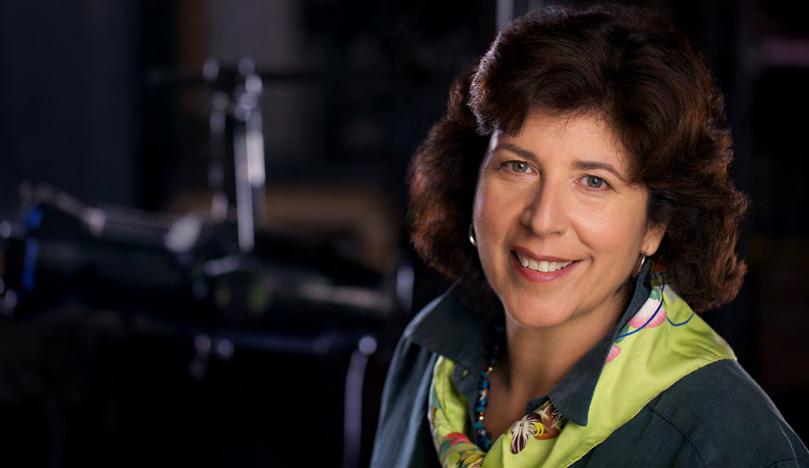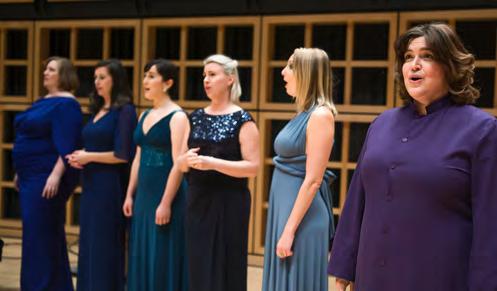
6 minute read
Feature: Hildegard & Zambello
Hildegard von Bingen & Stage Director Francesca Zambello
Two Avant-Garde Women: An Artistic Pair Unleashing Musical Magic

In January, under the artistic direction of the much-celebrated Director Francesca Zambello, Seraphic Fire is excited to present four performances of Hildegard von Bingen: Ordo virtutum. This dramatic play, often referred to as the precursor to modern opera, was composed by Hildegard c . 1151 and specifically intended to be performed by the women of her convent . The music portrays a wandering soul struggling between the powers of good and evil . It certainly has the feel of a modern-day opera with a wealth of drama that explodes in the music . Hildegard was awarded tremendous respect during her life and that this music is the only medieval musical drama surviving with an attribution for both the music and the text is testament to that fact . Born to a noble family in 1098, Hildegard of Bingen began to experience religious visions even as a child . She would emerge as one of the leading thinkers of that period, making significant contributions to philosophy, theology, music, and sciences . She corresponded with Popes and kings, a remarkable involvement for a woman in that era .
Born to a noble family in 1098, Hildegard of Bingen began to experience religious visions even as a child. She would emerge as one of the leading thinkers of that period, making significant contributions to philosophy, theology, music, and sciences. She corresponded with Popes and kings, a remarkable involvement for a woman in that era.

Fast forward to the 21st century where Francesca Zambello has excitedly accepted the challenge of fashioning a descriptive scenario and unfolding the storyline for this ancient Latin dramatic work. Like Hildegard, Zambello’s creative, trail-blazing spirit, and leadership in her profession are duly recognized. An internationally-renowned theatre and opera director, Zambello is the Artistic and General Director of Glimmerglass Festival and the Artistic Director for Washington National Opera. Her love of the creative arts was nurtured growing up in the theatre with a mother and father who were actors . “Being around theatre at an early age, I worked my way up from production assistant starting with my summers in high school. I always knew I wanted to be a director. I was interested in the big picture, the big story,” relates Zambello .
Zambello’s musical talents were fostered by her grandmother, a concert pianist who taught her granddaughter regular lessons. She not only learned piano but picked up a variety of instruments in school including flute and bass clarinet. As she became more focused in her studies, the Performing Arts Library at Lincoln Center proved to be a learning ground where Zambello said she “would bury her head in scores and recordings. In a sense, that was my training. ”
Going back to Europe after school, Zambello’s first “job” was as an intern in Germany at an opera house. Today, her directing career features productions at premiere houses around the world: Met Opera, Teatro alla Scala, the Bolshoi, La Fenice, Royal Albert Hall, Paris Opera, Covent Gardens, Munich Staatsoper, Houston Opera House, San Francisco Opera; the list goes on. Her talents expanded into BBC television and onto Broadway with shows such as The Little Mermaid. Fluent in French, Italian, Russian, and German, Zambello finds herself drawn to some of the classical directors in Europe for her inspiration. It makes perfect sense that she has received prestigious awards from the Italian, Russian, and French governments for her positive contributions and promotion of those cultures.
Zambello approaches her directing challenges from the audience perspective: “What is the way that I am going to build the world that the story lives in? How is the space going to help tell and clarify the story? You have to create a visual space that holds the story,” says Zambello. “I feel like I learned a lot from great directors of film. Film chooses where you look. We, the director, through lighting, scenery and production values create where you look. You want the performers to pop.”
Patrick Dupre Quigley, Seraphic Fire’s co-founder, and artistic director, had discussed Hildegard with Zambello a year ago and she expressed her intrigue with the Saint and her music. Once Quigley had a vision for the joint CD release and Seraphic Fire performance in 2022, he offered Zambello the opportunity to direct and was delighted with her quick acceptance. “There’s a different stage every night,” described Quigley. “There’s no typical theatre staff or costume designers. We wanted a production that could travel around. It’s a set of challenges that also intrigued Zambello. She is building the space dramatically with the staging rather than a set. Francesca is coming in to realize the full potential of the music. I am getting out of the way as much as possible. This is not a piece that is meant to be conducted. We are performing it as Hildegard intended it to be – a drama. It’s a stunning piece of music. Hildegard had no orchestra and neither will we.”
In January, Seraphic Fire patrons will have the rare opportunity to see the talents of these two dynamic and creative female artists, albeit 1,000 years apart, meld together to create musical magic . Hildegard was an extraordinary and revered personality in her time, composing at least 70 pieces of music, preaching from the pulpit, creating her own language, and writing texts on botany and holistic medicine . Her legacy is undeniable . Likewise, Francesca Zambello has been a tenacious innovator throughout her career, not only as a creative virtuoso, but also leading the way for female artists to excel in their artistic career paths . By directing Ordo virtutum, she once again seeks to expand the realm of her audience, drawing them into the world of Hildegard von Bingen and her convent of nuns where they enact the age-old battle between human virtue and the devil’s temptation .





